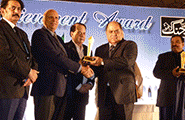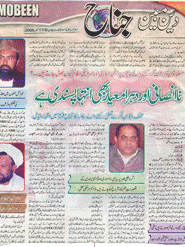28. 11. 14
Click here to View Printed Statements
The Pakistan Economy Watch (PEW) on Thursday said shale oil and gas is the only option to revolutionise the energy sector of Pakistan settling energy crisis forever.
Pakistan has estimated reserves of 105 trillion cubic feet (TCF) of shale gas enough to meet all the demand for next 45 years while 9.1 billion barrels of shale oil can satisfy country’s demand for next 61 years resulting in zero trade deficit.
Recently formulated Shale Oil and Gas Regulatory Framework is not strengthen enough to bring desired results therefore it must be beefed up immediately, said Dr. Murtaza Mughal, President PEW.
Shale oil and gas should be high on the government’s agenda as it will reduce burden on national exchequer and its impact on environment would not be as bad as that of coal.
read more…
In: UncategorizedAuthor:
24. 11. 14
Click here to View Printed Statements
Pakistan stands 10th in $431 billion fake medicines market
The Pakistan Economy Watch (PEW) on Sunday said unsuspecting masses are facing growing threat from fake medicines which must be tackled immediately.
Weak laws, lax supervision, minor punishments and nominal fines are enough to attract criminals to this low-risk and high-return business while the same in sufficient to discourage investment in the pharma sector, it said.
Government should take immediate action to dislodge the criminal networks earning billions from this cynical trade, said Dr. Murtaza Mughal, President PEW.
WHO report suggests that ratio of fake medicines in developed countries is one percent; it is 30 percent or more in developing markets while 30 to 40 percent medicine sold in Pakistan are fake.
read more…
In: UncategorizedAuthor:
19. 11. 14
Click here to View Printed Statements
The Pakistan Economy Watch (PEW) on Tuesday proposed steps to stop massive recirculation of expired medicines in Pakistan.
Fiftyone percent of all the medicines used by humans are in shape of pills and capsules and every pharmaceutical produces billions of tablets annually.
Many tablets get expired on shelves which are recirculated by some elements for profit which must be stopped, said Dr. Murtaza Mughal, President PEW.
He said that recirculation of expired drugs can be discouraged if authorities decide to make embossing of batch number and expiry date on every tablet compulsory.
Embossing batch number and expiry date on every tablet is mandatory in many countries but the issue is yet to win attention of authorities in Pakistan, he added.
read more…
In: UncategorizedAuthor:
17. 11. 14
Click here to View Printed Statements
The Pakistan Economy Watch (PEW) on Sunday said government’s new energy load management plan is flawed and unfeasible in the prevailing circumstances.
The recently announced electricity and gas load management plan which prefers textile sector over masses is highly faulty and largely suppositional, it said.
The decision shows a major policy shift which will please the influential textile sector but it may hardly work for a month only, said Dr. Murtaza Mughal, President PEW.
He said that the country’s malfunctioning energy system lacks capacity to exempt the Punjab’s textile industry from loadshedding without compromising other critical sectors.
read more…
In: UncategorizedAuthor:
15. 11. 14
Click here to View Printed Statements
Pharmaceuticals asked to improve quality of products
Int’l donors buying medicines from other countires for Pakistan
The Pakistan Economy Watch (PEW) on Friday asked the pharmaceutical companies to improve quality of their products.
Manufacturers must refocus to address current processes, practices and systems, and take a hard line on improving their overall quality and compliance efforts, it said.
Excessive attention on new drugs and profits has compromised the quality of medicine manufacturing facilities in Pakistan, said Dr. Murtaza Mughal, President PEW.
Many companies in Pakistan have failed to prefer quality over other consideration while paying little attention to corrective and preventive actions, complaint investigation, product rejections, recalls, deviations, audits, inspections and monitoring, he said.
Dr. Murtaza Mughal said that it is embarrassing that international donors would buy medicines from other countries to distribute among displaced or people affected from natural disasters.
read more…
In: UncategorizedAuthor:
10. 11. 14
Click here to View Printed Statements
The Pakistan Economy Watch (PEW) on Sunday said rising population of youth can become a global threat to political and economic stability if not tackled properly.
The situation would be critical in the developing countries housing 85 percent of the world’s young population, it said.
Unemployment has steadily been increasing in the young pushing them to crimes, extremism, illicit activities and narcotics which has a destabilising effect on societies and economies, said Dr. Murtaza Mughal, President PEW.
He said that governments and the private sector are not discharging their responsibilities to change the lives of those forced to live on the margins of society which is unfortunate.
Dr. Murtaza Mughal said that almost half of the global population is under 25, with 1.3 billion people are between the ages of 12 and 24 while most of them lack job or business opportunities.
read more…
In: UncategorizedAuthor:
02. 11. 14
Click here to View Printed Statements
Transit facility to India to hit national, economic interests
Indian wants to use wheat as a political tool vs Pak
The Pakistan Economy Watch (PEW) on Saturday said India should not be given transit facility to transport its wheat to Afghan market as it is against our national interests.
Indian wish, if realised, could have devastating impact on agriculture, agro-based industry and society of the country, said Dr. Murtaza Mughal, PEW.
Government should not allow India a transit facility for wheat export to Afghanistan as Pakistan will lose Afghan market due to price difference which is result of Indian hidden subsidies offered to exporters, he said.
Moreover, he said, sub-standard Indian wheat carry bugs which poses a major threat to our wheat crop and public health.
Dr. Murtaza Mughal said that Indian wheat would also be smuggled into Pakistan hitting entire pricing mechanism and raising healthcare issues in one of the most underdeveloped province of Khyber Pakhtunkhwa.
read more…
In: UncategorizedAuthor:





